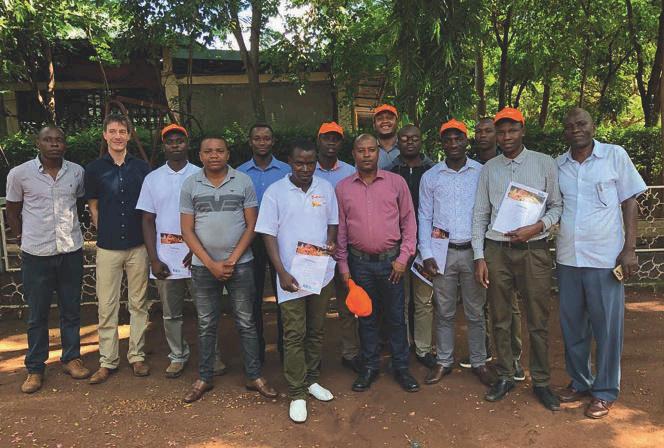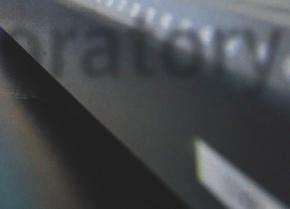
5 minute read
News and communications
from GD Update 1 2020
by Royal GD
Royal GD contributes to increasing testing capacity for COVID-19
The Dutch Ministry of Health, Welfare and Sport has announced that GD will also be testing human samples for the presence of the corona virus SARS-CoV-2. The test for the COVID-19 study has been validated in our own laboratory in Deventer.
Knowledge and experience
For the COVID-19 study, nose and / or throat swabs are collected from the patient. We examine these samples using PCR (Polymerase Chain Reaction) tests. This method allows the genetic material of the virus to be detected. We have a large diagnostic laboratory with a PCR department, where tens of thousands of samples are tested annually. Our employees have extensive experience in PCR research into viral infections and infections with other pathogens.
Ynte Schukken, CEO of Royal GD:
“The corona crisis affects us all. It is an uncertain time in which our adaptability is being heavily relied upon. Solutions are needed to get through this crisis as best as possible. It is nice that GD can now contribute by making test capacity available for research into the coronavirus SARS-CoV-2 in patients.“
For the COVID-19 diagnostics, we expect to be able to perform up to 2000 tests per day. In our laboratory we are set up for large numbers.
Introducing Frank Huis in ‘t Veld
Within GD we are constantly developing. From new tests to expanding our teams with new employees with extensive knowledge. Linking to that we would like to introduce you to Frank Huis in ‘t Veld, who has been working at our Support Team of Business Development and Contract Research & Consulting since December 2019.
Before Frank joined GD he worked for several international orientated production and whole sale companies in the Netherlands. His main focus was on inside sales and customer services. “The combination of the great awareness of environmental issues, and the important role that animal health plays in this, together with the wide variety of international customers really appeal to me at the work at GD,” he says.
According to him, customers can contact GD with all their questions. “We offer great services and see what is needed, also internationally. In addition, we are always there to inform our customers about the progress of your requests and orders. I am happy that I can now ful ll this role and be of service to you.”

Bulk milk investigation to improve claw health
In Western countries lameness is a serious problem in dairy herds. Most problems result in decreased milk production, premature culling, affection of animal welfare and nally less job satisfaction by the dairy farmers. Diagnosis necessary to get insight in the underlying causes is based on visual interpretation by the claw trimmers, who in the best circumstances are making some recordings. Since 2018 structural support to monitor and improve claw health is made possible by Royal GD by bulkmilk investigation. Over 800 Dutch dairy farmers are already monitoring claw health on their farm in this way.
MORE INFORMATION WWW.GDANIMALHEALTH.COM/CLAW
Services remain available
The COVID-19 outbreak also affects the Netherlands and measures are being taken to reduce spread of the virus. However, Royal GD is fully committed to continue all her services regarding laboratory diagnostics and (animal health) projects. In the GD laboratory, the testing of submitted samples continues as normal. The customer service and your account manager are still available and we do our very best to keep our services at the level you are used to. We shall of course keep you posted of any developments. Should you have any general questions, please contact support@gdanimalhealth.com.


The GD specialists focus their daily work on gathering and sharing their extensive knowledge of animal diseases. Mattheus Hekman, Business Developer and new to GD, is mainly focused on infectious diseases in cattle, and on establishment of international training courses and support in the eld of animal health.


With his background as a veterinary practitioner and experience at large dairy cattle integrations in Saudi Arabia, among other places, Mattheus certainly knows the ins and outs of the cattle sector. He sees the farms growing both in the Netherlands and abroad. “That’s a good thing,” he explains. “But it’s important that the entire organisation is included in that growth.” According to him, one of the most important aspects is to keep a grip on the day-to-day management. “All day-to-day processes are interconnected, and manifest themselves in the production and animal health. The better the visibility and control, the better the animal health, and the easier and more ef ciently a farm can be run.”


Working according to protocol
He believes communication to be extremely important, when looking to improve animal health and your operating results. “If employees understand the principles of infection transfer for example, the hygiene measures become very logical to them, and they are more likely to apply them correctly. Especially if their direct superior also shows them to have effect.”
At certain farms, it can sometimes be tricky to explain the vision to everyone or to enter into a dialogue with all employees. “In my experience, training personnel in working according to protocols can be very useful. If you can train your personnel in the management of animal health and can work with xed systems, everyone knows exactly what they are expected to do,” he explains. Mattheus believes this link between working in an organised manner and animal health to be extremely important, both at farms in the Netherlands and at large integrations abroad.
Monitoring remains important
For GD, Mattheus is now looking for ways to support farms abroad. From nding local partners for laboratory testing to the establishment of the training courses described earlier. “We’re seeing more and more farms with a great deal of in-house know-how, who can treat the animals themselves. This effective management already controls many problems, though the monitoring process remains important. I often apply a phased plan: Is everything working well or are problems recurring? If so, identify the problem and draw up a plan of approach. If everything’s working well, you simply keep monitoring. Following phased plans and working systematically gives you much more insight into the health of your herd.”






